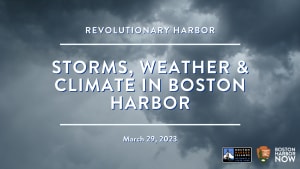Revolutionary Harbor: Storms, Weather & Climate in Boston Harbor
Wednesday, Mar 29, 2023 6:30p -
8:00p
Where:
Online event
Admission:
FREE
Categories:
History, Lectures & Conferences, Nature, Virtual
Event website:
https://www.bostonharborislands.org/event/revolutionary-harbor-storms-weather-climate-in-boston-harbor/
Join the National Park Service in conversation with meteorologist Harvey Leonard and coastal scientist Dr. Mark Borrelli to explore big storms in Boston Harbor.
They will discuss how weather and climate are related (but not the same), share stories about major historic storms in Boston, and discuss how these extreme weather events will continue to shape Boston Harbor and the islands in an era of rapid climate-change.
About Harvey Leonard: Harvey Leonard is WCVB Channel 5’s chief meteorologist emeritus. After a fifty-year career in meteorology, with more than forty-five of those years forecasting weather in New England and twenty of those at WCVB, Harvey retired from the helm of StormTeam 5 in May 2022 and transitioned into his emeritus role. In this new position, Harvey continues to serve the community with important information as a periodic contributor to StormTeam 5 coverage and engage in community speaking appearances.
Widely regarded as The Dean of Boston Meteorologists, Harvey has received numerous awards throughout his luminous career, including induction into the 2018 Massachusetts Broadcasters Hall of Fame and the 2021 Gold Circle presented by The National Academy of Television Arts & Sciences (NATAS) Boston/New England Chapter; and the 2016 Boston/New England Emmys Governor’s Award for Lifetime Achievement.
He is credited as the first meteorologist to correctly predict the impact and intensity of the infamous Blizzard of ’78.
Harvey received a Bachelor of Science degree in meteorology from City College of New York and earned a Master of Science degree in meteorology from New York University, where he also served as an instructor in meteorology.
About Dr. Mark Borrelli: Dr. Mark Borrelli is a coastal geologist and researcher with the Stone Living Lab. In 2018 he became the founding Director of the Coastal Processes and Ecosystems Laboratory, or CaPE Lab, a joint research effort between the School for the Environment within the University of Massachusetts at Boston and the Center for Coastal Studies in Provincetown, Massachusetts.
He has been the Director of the Seafloor Mapping Program at the Center since 2009 where has led over 200 vessel-based acoustic surveys in very shallow, nearshore waters. His research interests include coastal sedimentary processes, in general, and understanding how storms, sea level rise and anthropogenic alterations affect the coast, in particular.
He received a BS from Tufts University, an MS from the University of North Carolina at Chapel Hill and a PhD from the University of Rhode Island.
-

Sponsored -

Sponsored -

Sponsored -

Sponsored -

Sponsored -

SponsoredGood Morning Newbury Street, with coffee!
Saturday, Apr 26, 2025 9:00a
Outside the Newbury Hotel entrance
-

SponsoredBoston Chocolate Tour - Beacon Hill to Boston Public Market
Saturday, Apr 26, 2025 11:00a
Meeting Spot
-

Sponsored¡Conversaciones Crepusculares!: free in-person Spanish convo practice
Friday, May 02, 2025 4:00p
Boston Area Spanish Exchange (BASE)
-

Sponsored


